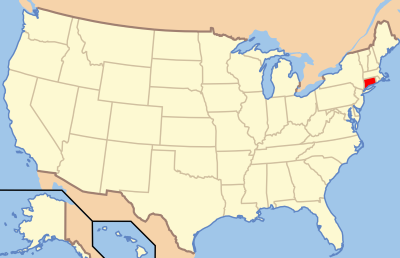Here you’ll find the largest list with Connecticut hosting reviews. We’ve listed all Connecticut web hosting providers with our UNCENSORED review and that of users.

Quick Facts
Internet Speed: 30.1 Mbps downlink; 8.3 Mbps uplink
Population: 3,6 million
Internet Coverage: 95% of residents
Main Internet Services: Cable, DSL, Fiber
Main ISPs: Xfinity, Atlantic Broadband, Frontier, Windstream
Colocation Datacenters: 16 (prominent companies: CyrusOne, Fibertech Networks, Level 3 Communications)
Internet in Connecticut
According to Akamai.com, the average downlink Internet speed in Connecticut is 30.1 Mbps and the average uplink speed is 8.3 Mbps.
In 2016, the population of Connecticut was approximately 3,6 million. More than 95% of residents have access to the Internet, especially broadband connections.
Major Internet services provided in Connecticut are as follows:
– Cable – 97% of residents
– DSL – 97% of residents
– Fiber – less than 10% of residents
Major Internet Service Providers located in Connecticut are the following:
– Xfinity (Cable) – 90% availability
– Atlantic Broadband (Cable) – 85% availability
– Frontier (DSL) – 90% availability
– Windstream (Fiber) – less than 10% availability
Gigabit Internet in Connecticut
In September 2016, Atlantic Broadband, the country’s ninth largest cable provider, publicly announced that they would start rolling out gigabit Internet services to over 37,000 homes located in eastern Connecticut. Beneficiary cities include but are not limited to East Lyme, New London, Oakdale, and Quaker Hill. This service is provided through existing coaxial copper lines. Other companies such as Xfinity and Frontier have shown interest, but are still in the testing phase.
Colocation Datacenters in Connecticut
According to datacentermap.com, there are currently 16 colocation datacenters distributed across Connecticut. Most datacenters are located in Stamford (5), closely followed by New Haven (3) and Hartford (3).
Major colocation providers located in Connecticut are as follows:
– CyrusOne
– Fibertech Networks
– Level 3 Communications
– Amnet Technology Solutions
– Data Ark Systems, LLC.
One of the biggest colocation providers located in Connecticut is CyrusOne, whose main facilities are located in Stamford and Norwalk respectively.
CyrusOne Norwalk Datacenter
Their biggest datacenter is located in Norwalk. The 150,000-square-foot facility offers up to 16 MW of power and 30,000 square feet of work area recovery space. It is a premier choice for companies along the East Coast in need of production, disaster recovery, as well as business continuity solutions. Additionally, the facility benefits from carrier-neutral connectivity, diverse redundancy solutions, and multi-layered security.
CyrusOne Stamford Datacenter
Another datacenter of theirs is established in the central business district of Stamford, 33 miles from Midtown Manhattan. It is one of several strategic, mission-critical datacenters in Connecticut, New York, as well as New Jersey.
This 57,000-square-foot facility provides wholesale and retail colocation services, disaster recovery, as well as business continuity solutions. It also offers carrier-neutral connectivity, with diverse access to multiple ISPs and colocation providers.
Colocation Industry in Connecticut – Current Trends, Advantages, Market Importance
The colocation industry of Connecticut continues to experience moderate growth as multiple colocation providers are being established in the region, such as CyrusOne and Colocation America.
Connecticut is regarded as an attractive colocation market because of its close proximity to New York and New Jersey, both of which being substantially more expensive markets, which currently experience all-time low vacancy rates. Demand for colocation services is driven mostly by local companies looking for local solutions, but also by customers coming from NY and NJ respectively.
In spite of the NY-NJ proximity advantage, the lack of proper fiber infrastructure and the region’s somewhat high risk for natural disasters (8 hurricanes since 1954) are two main reasons Connecticut remains a secondary, nay tertiary datacenter market in the United States.

